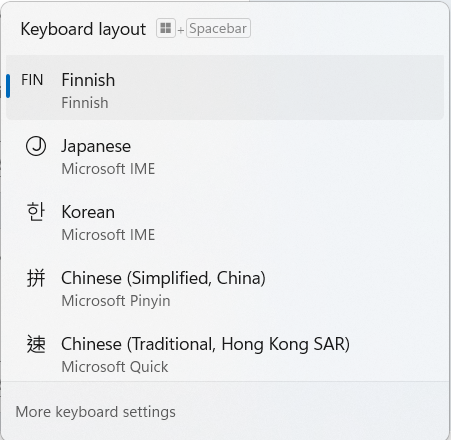Hindi IME
If you need to enter some text in Hindi, Windows includes an Input Method Editor and keyboard layouts that let you enter text using the Devanagari script while using a typical keyboard with 101-105 keys. Using the IME doesn't require changing your current Windows display language.
Add support for Hindi input
To add support for Hindi input to Windows:
- Open Settings and select Time & language > Language & region.
- Select Add a language. Select Hindi from the list and select Next.
- Consider if you need any of the Optional language features. If you want to enter Hindi text while keeping your current Windows display language, none of them are necessary. When you're happy with your choices, select Install.
By default, Hindi is installed with the Hindi Traditional keyboard. To install the Microsoft Hindi Phonetic IME:
- On the Language & region page, select the Options (…) icon next to Hindi and select Language options.
- Select Add a keyboard and select Hindi Phonetic.
Type Hindi text
The Windows system tray shows which keyboard layout is currently active, for example, ENG. You can switch between installed layouts (layouts in the Preferred languages list in Settings) by selecting the Windows logo key + Spacebar.
If you prefer, you can also change the layout by selecting the system tray icon and selecting the layout from the list. This method can be faster if you have more than two languages installed.

If multiple IME/keyboards are installed for a given language, the list and the tray icon will show a combination of language and layout.
Use the Hindi Phonetic IME
To type text in the Devanagari script using the Hindi Phonetic IME:
- Select Hindi Phonetic. The system tray now shows हिं instead of ENG indicating that you can now type in Hindi.
- Type the transliteration of the word you want with the English keys. As you type, notice that the Hindi Phonetic IME automatically converts the English letters into Devanagari script suggestions. When you're finished typing, select Enter to convert your text into the first suggested Hindi word. You can also use the cursor keys to select a different suggestion.
Use the Hindi Traditional keyboard
To type text using the Hindi Traditional keyboard:
- Select Hindi Traditional. The system tray now shows हिं instead of ENG indicating that you can now type using the Devanagari script.
- Using the Hindi Traditional keyboard layout, type the Hindi word you want.
Example
The Hindi word for garden is बगीचा, which can be transliterated as bagicha or bageecha.
Type with the Hindi Phonetic IME
To type बगीचा, select the Hindi Phonetic IME from the system tray. Then type bagicha with the English keys. As you type, you can see how the IME turns the text into word suggestions. When you're finished typing, the top suggestion is the correct Hindi word. Select Enter to convert the English letters into Devanagari script.
Type with the Hindi Traditional keyboard
To type बगीचा, select the Hindi Traditional keyboard layout from the system tray. Use the following keystrokes to type the Hindi word for garden:
| Devanagari letter | Keystroke on the English US keyboard | Phonetic equivalent |
|---|---|---|
| ब | y | ba |
| ग | i | ga |
| ◌ी | r | {vowel sign ii} |
| च | ; | ch |
| ◌ा | e | {vowel sign aa} |
When you're finished typing, the word बगीचा appears on the screen.